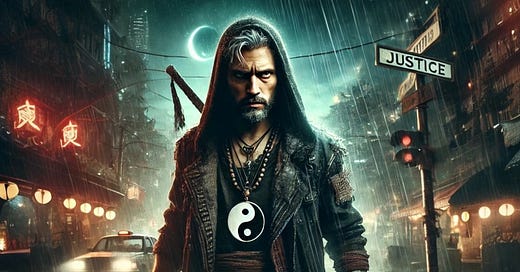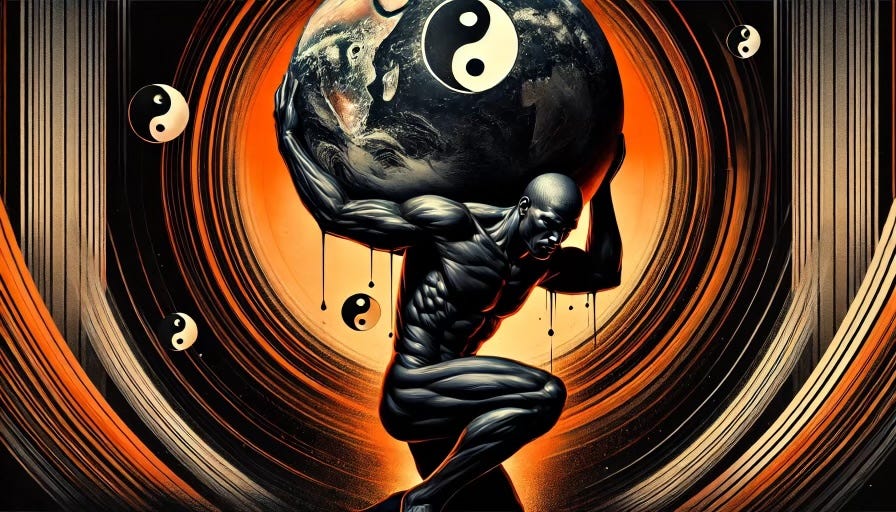The recent murder of the United Healthcare CEO in New York has reignited a centuries-old debate about the morality of vigilantism and the role of anarchistic impulses in a world defined by societal order.
In an age where the powerless often feel unheard, the specter of revenge justice looms large, echoing across historical, philosophical, and literary landscapes.
To understand the roots of this phenomenon and its implications, let’s take a journey through the annals of anarchism, the wisdom of Lao Tzu, the I Ching’s guidance, and the subversive narratives of The Girl with the Dragon Tattoo.
This essay is not a defense or condemnation but a reflection on the dance between justice and chaos and the paths we walk in the pursuit of balance.
Anarchism: History, Evolution, and its Roots in Vigilantism
Anarchism, often misunderstood as lawlessness, is, at its core, a philosophy of decentralization. Emerging as a reaction to oppressive systems, it seeks to dismantle hierarchies that exploit the many for the benefit of the few.
In the late 19th and early 20th centuries, anarchist movements gained notoriety through acts of defiance against industrialist oligarchies and corrupt governments. Figures like Emma Goldman and Peter Kropotkin, whose works I have read extensively, advocate for direct action, some peaceful and some violent, to resist the machinery of control.
Vigilantism, though distinct, shares a philosophical kinship with anarchism in its rejection of institutionalized justice. Both arise from a perceived failure of the system to uphold fairness.
In modern times, Anonymous —digital vigilantes—have become a new iteration of this impulse, targeting the financial and political elites in the name of exposing corruption and advocating for the powerless.
While anarchism questions the very foundation of centralized authority, vigilantism operates as a shadow system of justice, often walking a precarious line between heroism and criminality.
Lao Tzu and the Tao: The Futility of Force
Lao Tzu, the ancient Chinese philosopher, would likely view vigilantism and anarchism as misguided attempts to control what should be allowed to flow naturally.
The Tao Te Ching warns against force and intervention, emphasizing the wisdom of wu wei—effortless action aligned with the natural order. In verse 30,
Lao Tzu writes:
“Those who use force will later meet with force.The Master does not take sides. Rather, he welcomes both saints and sinners.
From the Taoist perspective, revenge justice disrupts the harmony of the Tao, perpetuating cycles of violence that deepen rather than resolve human suffering.
Lao Tzu might argue that the killing of the United Healthcare CEO, regardless of its motivations, represents the kind of forceful intervention that leads to further chaos.
And yet, the Tao also acknowledges the inevitability of human action. Like a river carving through stone, anarchism and vigilantism arise when systems are too rigid to adapt, signaling a need for balance rather than control.
The I Ching: A Reflection on Revenge
Turning to the I Ching, we encounter a nuanced perspective on the cycle of vengeance. Hexagram 6, Conflict (Song), offers this counsel:
“Conflict develops when one is convinced of their own righteousness. To resolve it, one must seek the higher path, refraining from stubborn self-will.”
The wisdom of the I Ching suggests that revenge justice is born of unresolved conflict within, projected outward onto the world. It challenges us to question our motives and embrace the transformative power of non-resistance.
While the impulse to avenge injustice is deeply human, the I Ching asks us to consider whether such actions bring resolution or merely perpetuate discord.
The Girl with the Dragon Tattoo and Modern Vigilantism
As I reflect on these ancient teachings, I am reminded of Stieg Larsson’s book The Girl with the Dragon Tattoo.
Lisbeth Salander, the novel’s enigmatic anti-heroine, embodies the archetype of the avenger. Abused by the system and those meant to protect her, she takes justice into her own hands, exacting revenge with ruthless precision. Larsson’s narrative taps into the collective yearning for accountability in a world where power often shields wrongdoing.
Yet, Lisbeth’s story is also a cautionary tale. Her path is one of isolation and pain, a stark reminder of the toll exacted by living outside the law. As much as she captivates us, her journey underscores the emotional and spiritual costs of vengeance.
In a world increasingly dominated by ethical hackers and decentralized justice movements, Lisbeth’s character resonates deeply. From Anonymous to whistleblowers like Edward Snowden, modern vigilantes operate in the shadows, challenging systems that appear impenetrable.
But their actions raise critical questions: Who decides what is just? And at what point does the pursuit of justice become indistinguishable from the chaos it seeks to eradicate?
Modern Vigilantism in the Digital Age
The Anonymous movement embodies a contemporary form of anarchism, leveraging technology to subvert authority and expose corruption. In many ways, they are digital disciples of the Tao, navigating the ever-changing flows of information with skill and subtlety.
Yet, the Tao Te Ching’s warning against force remains relevant here. In destabilizing systems, hackers risk creating vacuums of power that invite greater harm.
This paradox captures the essence of vigilante justice. While it arises from noble intentions, it often succumbs to the very chaos it seeks to combat.
The Tao offers a different path—not one of passivity but of alignment with the natural order. Justice, from a Taoist perspective, is not imposed but cultivated, emerging organically when systems are attuned to the needs of all.
Toward a New Balance
As we navigate a world rife with inequities, the tension between justice and chaos remains ever-present. The murder of the United Healthcare CEO, like the actions of Lisbeth Salander and ethical hackers, forces us to confront uncomfortable truths about power, accountability, and the human need for retribution.
Yet, the wisdom of Lao Tzu and I Ching reminds us that true justice cannot be forced—it must flow from harmony, patience, and understanding.
In this moment of societal upheaval, we are called not to abandon the pursuit of justice but to reimagine it. By embracing the principles of balance and non-resistance, we can transcend cycles of vengeance and create systems that honor the interconnectedness of all life.
Join us today as a paid member supporter. Or feel free to tip me some coffeehouse love here if you feel so inclined.
Your contributions are appreciated!
Every bit counts as I strive to deliver high quality feature articles into your inbox on a daily basis. Never any paywalls, just my raw thoughts which are open to everyone on what it means to be human.
Much Love,
Diamond Michael Scott — aka The Chocolate Taoist







I love your essay and the Chocolate Taoist too much to offer my own sentiments on the subject of the murder event because I was forever impacted by The Tale of Two Cities when I was in high school and cannot take the side of outrage against Luigi at this point in time. Chaos will ensue and maintain until there are "attractors" that can manage to bring Order to the system we all must endure somehow for now. In the meantime I offer sorrow, tears, grief and compassion.
Such an excellent post — so different from every other commentary on this sad and horrific event.